
Kenji Goto's reporting is voice of humanity in times of atrocity
後藤健二氏の声は凶行に対する人の道の訴えだ
By Henry Tricks/CPJ Guest Blogger
状況は厳しさを増しているが後藤氏の無事解放を祈りたい。 私たちの物差しが通じない世界があるという冷徹な現実を我々も強く自覚する必要がある。 これだけ用意周到で現地事情に通暁した人物でも捕虜となる。ガイドに裏切られたというのが彼の最後の言葉だと聞いている。国境を越えて活動する機会が多くなる人はこの事件を対岸の火事と思っていたら大お間違いだ。 中東に限らず油断は禁物である。

Supporters of Kenji Goto gather outside the Japanese prime minister's Tokyo residence at a rally for the journalist, who is being held hostage by the Islamic State. (Reuters/Yuya Shino) サポーター達は東京の総理官邸の前でイスラム国の捕虜となっているジャーナリストの後藤健二氏のために集会を開いている。
Kenji Goto, the 47-year-old television journalist held captive by the Islamic State (IS), is not a typical reporter, nor is he typically Japanese. But his courage and commitment to broadcasting humane stories from some of the world's most dangerous conflict zones would put him at the pinnacle of his profession anywhere in the world. It was such courage that took him to Syria last year, where he was taken hostage.
ISの捕虜となっているテレビジャーナリストの後藤健二氏(47)は並のレポーターでもないし、日本人的なタイプの人物でもない。 彼が世界中で一流のジャーナリストとして高く評価されているのは、世界中のもっとも危険な地帯から人道的なレポートを送り続ける彼の勇気と信念に基づいた行動力である。その勇気が彼を昨年シリアに向かわしめ、結果としてそこで捕虜となってしまった。
After the tragic murder last week of his fellow hostage and friend, Haruna Yukawa, the militant group released a statement conditioning his release on a swap with a woman imprisoned in Jordan after a failed suicide bombing.
彼の友人であり同様に捕虜となっていた湯川晴菜氏を殺害したあと、ISの武装集団は自爆テロに失敗しヨルダンに拘束されている女性死刑囚と後藤氏の解放を交換条件として提示してきた。
Today, IS released a video with a voiceover said to be Goto's, which claims he has 24 hours left to live unless his captors' demands are met. Whatever the outcome, Goto's capture is an outrage.
今日、後藤氏の声とおもわれる音声とともにビデオをインターネット上にアップし、彼らの要求が満たされなければ彼に残された時間は24時間しかないと伝えてきた。どのような結果になろうと、彼の拘束に大変な憤りを感じている。
I met Goto in 2010 when I was bureau chief for The Economist in Tokyo. He was an occasional neighbor, when he wasn't visiting trouble spots in the Middle East. He is a much-loved father, who has three children. It is hard to reconcile the soft-spoken, gentle man, who once paled in a bowling alley because the sound of the balls reminded him of bombs dropping on Iraq, with the image of a hardened war correspondent. But he covers wars with a difference.
後藤氏と会ったのは私が東京のエコノミスト誌の編集長時代であった2010年である。彼はたまたま私のご近所であり、当時はまだ厄介な中東地区には関与しておらず、3児のよき父親だった。 かつてボーリング場でボールの音がイラクの爆撃を思い出させると顔を曇らせていた、ソフトな語り口の穏やかな人物像はタフな戦場記者のイメージからほど遠いものであった。 しかし、彼は戦争を違った観点で伝えていた。
Instead of focusing on who is winning or losing, he tells the stories of ordinary people, especially children, who are forced to endure conflict and the horrors surrounding them. It is their resilience that inspires him, he says. When you ask how he reaches the dangerous places he reports from, he says he follows the footsteps of normal people getting on with their lives. They show him the way.
つまり、戦場における勝敗に焦点をおくのではなく、彼は普通の人々の日常、特に紛争や恐怖の中で、それらに耐えて生きざるを得ない子供たちに目を向けていた。心を打たれたのは、そういう悲惨さの中にあっても生きる子供たちのしなやかな強さだと彼は語っていた。どのようにして危険地帯に入ることが出来るのかと問われて、彼はそこに住んで生活している普通の人々の後をついていくのだと答えている。彼らが道を知っていると。
Since founding his news agency, Independent Press, in 1996, he has covered conflict in Chechnya, Albania, Kosovo, Sierra Leone, Liberia, Afghanistan, Iraq, and Syria, among other places. As a freelancer, he funds many of these trips himself. In Japan, there is an almost tribal loyalty between TV networks and their staff, but Goto has won the respect of the networks by visiting places they are reluctant to send their correspondents to.
1996年にインディペンデントプレスというニュースエージェンシーを創設して以来、彼はチェチェン、アルバニア、コソボ、シエラレオネ、リビア、アフガニスタン、イラクそしてシリアと紛争地をレポートしてきた。 フリーランスとして彼は自腹でこれらの取材をこなしてきた。 日本ではテレビ局とそのスタッフの間には殆ど馴れ合いといっていい関係があるが、彼はテレビ局が記者達を送り込むのに二の足を踏むような場所へ踏み込むことで多くのテレビ局から尊敬されていた。
His documentaries regularly air on NHK, Japan's national network, TV Asahi and others. But he would insist on taking responsibility for his own safety so they would not be blamed if he came to any harm. His friends think that was the point of his last video, recorded on October 25, before his kidnap, in which he said he took full responsibility for his actions.
彼のドキュメンタリーは国営放送のNHKやテレビ朝日などでよく報道されていたが、彼は自身の身の安全は自分の責任であり、自分の身に何か起こったとしても、それは他の誰の責任でもないと日頃から言っていた。 彼の友人達は彼が誘拐される前の10月25日に残したビデオメッセージで言いたかったのはその点だと考えている。
Goto has experienced the full horror of war. In Liberia, friends recall, he talked about seeing hundreds of bodies being bulldozed into a grave the size of a swimming pool. In Iraq, he said a soldier put a gun to his head. But he has sought to draw out lessons from his reporting that are uplifting, especially for children.
後藤氏は戦争の怖さを骨身にしみるほど経験している。 リビアでは何百という遺体がプールのような穴にブルドーザーを使って埋められている光景を見たと話していたし、威嚇では彼自身が頭に銃をつきつけられた経験もしている。これらの経験から、子供たちに伝えるべき教訓を引き出そうとしていた。
His DVD and book, Welcome to Our School, brought out by NHK in 2003, featured children in countries including Iraq and Afghanistan introducing their schools, even those closed by conflict, and talking about their love of learning. He has also written books about AIDS, child soldiers in Sierra Leone, genocide in Rwanda, and schoolgirls in Afghanistan. On visits to schools, he has told children in Japan how privileged they are that school is such a "normal" part of life.
彼のDVDと本“ようこそ私たちの学校へ”は2003年にNHKで出版されたが、その中で彼はイラクとアフガニスタンなど各国の子供たちに焦点をあて、紛争で学校が閉鎖されてもなお学びたがっている様子を伝えている。 また彼はエイズ、シエラレオネの子供兵士、ルワンダの虐殺そしてアフガニスタンの女子学生などに関する本も出版しており、学校で講演などをしたときは、生活の中で普通に学校に通えることがいかに恵まれていることであるか、子供たちに話している。
On Japanese television he has brought the outside world to children with little knowledge of it. Akira Ikegami, a TV anchor, recalls hosting Goto on a NHK family news program where he tried so hard to project the pain of youngsters living in war-torn regions of the Middle East that it had a moving impact on the viewers. "He is a warm-hearted guy who has a sense of duty in his reporting," Ikegami told me via email.
Ikegami added that most Japanese tend to regard conflict in far-flung places as alien. But with his humanitarian approach, Goto has stirred up interest and inspired some to start voluntary work on behalf of refugees.
日本のテレビの中で、彼は世界を知らない子供たちに世界の状況を伝えてきた。テレビのアンカーマンである池上彰氏はNHK子供ニュースで後藤氏を迎えたことをよく覚えている。後藤氏はそこで視聴者にむけて戦火で疲弊した中東地域で生きる子供達の痛みを熱心に伝えようとしていた。それは視聴者の間で大きな共感を巻き起こした。「彼は報道において高邁な義務感もった、心の暖かい素晴らしい人物です。」と池上氏は私にEメールで述べている。 池上はまた、多くの日本人がこれらの紛争を遠くのよそ事のように見る傾向があったが、彼の人道的なアプローチに啓発されて難民のためにボランティア活動を始めるきっかけをつかんだものもいると話している。
In Japan, the popular pressure to free him is growing, after a hesitant start in which some attacked him on social media for being in Syria in the first place. An #IamKenji campaign on Facebook and Twitter has mushroomed. There had been growing hope he would be freed alongside Muath al-Kasabeh, the Jordanian fighter pilot also held by IS. However the latest video, if authentic, suggests Goto and the pilot remain in grave danger. A brave journalist who is a voice of humanity in the midst of atrocity is in the midst of a tragic hostage situation. He should be freed.
日本では当初は彼がシリアにいたことをソーシャルメディアで非難している人もいて、戸惑っていた人々もいたが、次第に彼を解放せよとの人々の声は高まってきている。 「私は健二」というFBやツイッター上のキャンペーンも急増している。イスラム国に囚われているヨルダン人パイロットのムアーズ・カサースベとともに解放されることに対する希望は高まっているが、直前のビデオでは、もしこれが本当とするなら、後藤氏とパイロットの運命は依然危機に瀕していると思われる。 人道活動の唱道者である勇気あるジャーナリストが捕虜となりまさに悲惨な状況にある。 彼は解放されるべきである。
Since 2013, Henry Tricks has been The Economist’s bureau chief for Mexico, Central America and the Caribbean. ヘンリー・トリックは2013年ラからメキシコ、中央アメリカ、カリビアンのエコノミスト誌編集長
後藤健二氏の声は凶行に対する人の道の訴えだ
By Henry Tricks/CPJ Guest Blogger
状況は厳しさを増しているが後藤氏の無事解放を祈りたい。 私たちの物差しが通じない世界があるという冷徹な現実を我々も強く自覚する必要がある。 これだけ用意周到で現地事情に通暁した人物でも捕虜となる。ガイドに裏切られたというのが彼の最後の言葉だと聞いている。国境を越えて活動する機会が多くなる人はこの事件を対岸の火事と思っていたら大お間違いだ。 中東に限らず油断は禁物である。

Supporters of Kenji Goto gather outside the Japanese prime minister's Tokyo residence at a rally for the journalist, who is being held hostage by the Islamic State. (Reuters/Yuya Shino) サポーター達は東京の総理官邸の前でイスラム国の捕虜となっているジャーナリストの後藤健二氏のために集会を開いている。
Kenji Goto, the 47-year-old television journalist held captive by the Islamic State (IS), is not a typical reporter, nor is he typically Japanese. But his courage and commitment to broadcasting humane stories from some of the world's most dangerous conflict zones would put him at the pinnacle of his profession anywhere in the world. It was such courage that took him to Syria last year, where he was taken hostage.
ISの捕虜となっているテレビジャーナリストの後藤健二氏(47)は並のレポーターでもないし、日本人的なタイプの人物でもない。 彼が世界中で一流のジャーナリストとして高く評価されているのは、世界中のもっとも危険な地帯から人道的なレポートを送り続ける彼の勇気と信念に基づいた行動力である。その勇気が彼を昨年シリアに向かわしめ、結果としてそこで捕虜となってしまった。
After the tragic murder last week of his fellow hostage and friend, Haruna Yukawa, the militant group released a statement conditioning his release on a swap with a woman imprisoned in Jordan after a failed suicide bombing.
彼の友人であり同様に捕虜となっていた湯川晴菜氏を殺害したあと、ISの武装集団は自爆テロに失敗しヨルダンに拘束されている女性死刑囚と後藤氏の解放を交換条件として提示してきた。
Today, IS released a video with a voiceover said to be Goto's, which claims he has 24 hours left to live unless his captors' demands are met. Whatever the outcome, Goto's capture is an outrage.
今日、後藤氏の声とおもわれる音声とともにビデオをインターネット上にアップし、彼らの要求が満たされなければ彼に残された時間は24時間しかないと伝えてきた。どのような結果になろうと、彼の拘束に大変な憤りを感じている。
I met Goto in 2010 when I was bureau chief for The Economist in Tokyo. He was an occasional neighbor, when he wasn't visiting trouble spots in the Middle East. He is a much-loved father, who has three children. It is hard to reconcile the soft-spoken, gentle man, who once paled in a bowling alley because the sound of the balls reminded him of bombs dropping on Iraq, with the image of a hardened war correspondent. But he covers wars with a difference.
後藤氏と会ったのは私が東京のエコノミスト誌の編集長時代であった2010年である。彼はたまたま私のご近所であり、当時はまだ厄介な中東地区には関与しておらず、3児のよき父親だった。 かつてボーリング場でボールの音がイラクの爆撃を思い出させると顔を曇らせていた、ソフトな語り口の穏やかな人物像はタフな戦場記者のイメージからほど遠いものであった。 しかし、彼は戦争を違った観点で伝えていた。
Instead of focusing on who is winning or losing, he tells the stories of ordinary people, especially children, who are forced to endure conflict and the horrors surrounding them. It is their resilience that inspires him, he says. When you ask how he reaches the dangerous places he reports from, he says he follows the footsteps of normal people getting on with their lives. They show him the way.
つまり、戦場における勝敗に焦点をおくのではなく、彼は普通の人々の日常、特に紛争や恐怖の中で、それらに耐えて生きざるを得ない子供たちに目を向けていた。心を打たれたのは、そういう悲惨さの中にあっても生きる子供たちのしなやかな強さだと彼は語っていた。どのようにして危険地帯に入ることが出来るのかと問われて、彼はそこに住んで生活している普通の人々の後をついていくのだと答えている。彼らが道を知っていると。
Since founding his news agency, Independent Press, in 1996, he has covered conflict in Chechnya, Albania, Kosovo, Sierra Leone, Liberia, Afghanistan, Iraq, and Syria, among other places. As a freelancer, he funds many of these trips himself. In Japan, there is an almost tribal loyalty between TV networks and their staff, but Goto has won the respect of the networks by visiting places they are reluctant to send their correspondents to.
1996年にインディペンデントプレスというニュースエージェンシーを創設して以来、彼はチェチェン、アルバニア、コソボ、シエラレオネ、リビア、アフガニスタン、イラクそしてシリアと紛争地をレポートしてきた。 フリーランスとして彼は自腹でこれらの取材をこなしてきた。 日本ではテレビ局とそのスタッフの間には殆ど馴れ合いといっていい関係があるが、彼はテレビ局が記者達を送り込むのに二の足を踏むような場所へ踏み込むことで多くのテレビ局から尊敬されていた。
His documentaries regularly air on NHK, Japan's national network, TV Asahi and others. But he would insist on taking responsibility for his own safety so they would not be blamed if he came to any harm. His friends think that was the point of his last video, recorded on October 25, before his kidnap, in which he said he took full responsibility for his actions.
彼のドキュメンタリーは国営放送のNHKやテレビ朝日などでよく報道されていたが、彼は自身の身の安全は自分の責任であり、自分の身に何か起こったとしても、それは他の誰の責任でもないと日頃から言っていた。 彼の友人達は彼が誘拐される前の10月25日に残したビデオメッセージで言いたかったのはその点だと考えている。
Goto has experienced the full horror of war. In Liberia, friends recall, he talked about seeing hundreds of bodies being bulldozed into a grave the size of a swimming pool. In Iraq, he said a soldier put a gun to his head. But he has sought to draw out lessons from his reporting that are uplifting, especially for children.
後藤氏は戦争の怖さを骨身にしみるほど経験している。 リビアでは何百という遺体がプールのような穴にブルドーザーを使って埋められている光景を見たと話していたし、威嚇では彼自身が頭に銃をつきつけられた経験もしている。これらの経験から、子供たちに伝えるべき教訓を引き出そうとしていた。
His DVD and book, Welcome to Our School, brought out by NHK in 2003, featured children in countries including Iraq and Afghanistan introducing their schools, even those closed by conflict, and talking about their love of learning. He has also written books about AIDS, child soldiers in Sierra Leone, genocide in Rwanda, and schoolgirls in Afghanistan. On visits to schools, he has told children in Japan how privileged they are that school is such a "normal" part of life.
彼のDVDと本“ようこそ私たちの学校へ”は2003年にNHKで出版されたが、その中で彼はイラクとアフガニスタンなど各国の子供たちに焦点をあて、紛争で学校が閉鎖されてもなお学びたがっている様子を伝えている。 また彼はエイズ、シエラレオネの子供兵士、ルワンダの虐殺そしてアフガニスタンの女子学生などに関する本も出版しており、学校で講演などをしたときは、生活の中で普通に学校に通えることがいかに恵まれていることであるか、子供たちに話している。
On Japanese television he has brought the outside world to children with little knowledge of it. Akira Ikegami, a TV anchor, recalls hosting Goto on a NHK family news program where he tried so hard to project the pain of youngsters living in war-torn regions of the Middle East that it had a moving impact on the viewers. "He is a warm-hearted guy who has a sense of duty in his reporting," Ikegami told me via email.
Ikegami added that most Japanese tend to regard conflict in far-flung places as alien. But with his humanitarian approach, Goto has stirred up interest and inspired some to start voluntary work on behalf of refugees.
日本のテレビの中で、彼は世界を知らない子供たちに世界の状況を伝えてきた。テレビのアンカーマンである池上彰氏はNHK子供ニュースで後藤氏を迎えたことをよく覚えている。後藤氏はそこで視聴者にむけて戦火で疲弊した中東地域で生きる子供達の痛みを熱心に伝えようとしていた。それは視聴者の間で大きな共感を巻き起こした。「彼は報道において高邁な義務感もった、心の暖かい素晴らしい人物です。」と池上氏は私にEメールで述べている。 池上はまた、多くの日本人がこれらの紛争を遠くのよそ事のように見る傾向があったが、彼の人道的なアプローチに啓発されて難民のためにボランティア活動を始めるきっかけをつかんだものもいると話している。
In Japan, the popular pressure to free him is growing, after a hesitant start in which some attacked him on social media for being in Syria in the first place. An #IamKenji campaign on Facebook and Twitter has mushroomed. There had been growing hope he would be freed alongside Muath al-Kasabeh, the Jordanian fighter pilot also held by IS. However the latest video, if authentic, suggests Goto and the pilot remain in grave danger. A brave journalist who is a voice of humanity in the midst of atrocity is in the midst of a tragic hostage situation. He should be freed.
日本では当初は彼がシリアにいたことをソーシャルメディアで非難している人もいて、戸惑っていた人々もいたが、次第に彼を解放せよとの人々の声は高まってきている。 「私は健二」というFBやツイッター上のキャンペーンも急増している。イスラム国に囚われているヨルダン人パイロットのムアーズ・カサースベとともに解放されることに対する希望は高まっているが、直前のビデオでは、もしこれが本当とするなら、後藤氏とパイロットの運命は依然危機に瀕していると思われる。 人道活動の唱道者である勇気あるジャーナリストが捕虜となりまさに悲惨な状況にある。 彼は解放されるべきである。
Since 2013, Henry Tricks has been The Economist’s bureau chief for Mexico, Central America and the Caribbean. ヘンリー・トリックは2013年ラからメキシコ、中央アメリカ、カリビアンのエコノミスト誌編集長













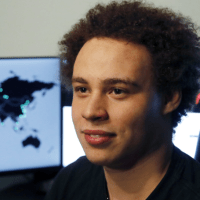
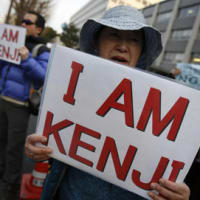
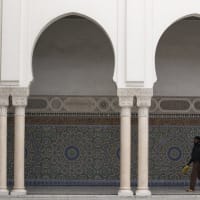
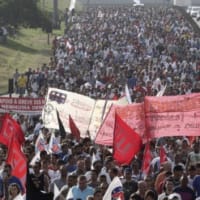
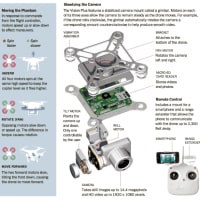
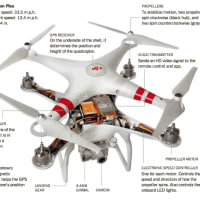
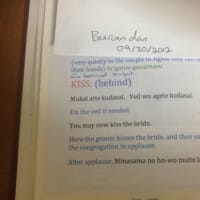
※コメント投稿者のブログIDはブログ作成者のみに通知されます